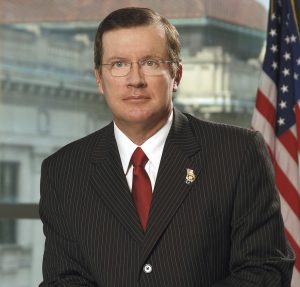
Imagine a frantic call to 911 from a woman who relays to emergency personnel that she has just been gang raped. Also imagine that woman mercifully telling police that the perpetrators videotaped this vicious sexual assault on one of their iPhones. The perpetrators and iPhone are recovered. Case solved? Every district attorney in the United States, myself included, wishes that were the case. Due to Apple’s decision to install default encryption on their smartphones, prosecutors and law enforcement face a problem unlike any before: private corporations denying law enforcement access to valuable evidence, irrespective of compliance with the Fourth Amendment. This is not something that should be praised or endorsed.
With the advent of more advanced technological capabilities and the rise of sophisticated state-sponsored hacks from China, Iran and North Korea, as well as from rogue entities, it is somewhat understandable why Apple and others have intensified their concern toward encryption. But encrypting phones so a device cannot be accessed by the company who created the device, even when presented with a valid search warrant, should be a cause of great concern to the public prosecutors are sworn to protect. Apple’s measures are unjustified, and frankly, one step away from harboring criminal activity. I can see the advertisements now—“Enjoying Child Pornography? Buy an iPhone. Protection from law enforcement guaranteed.”
Encrypting phones so a device cannot be accessed by the company who created the device, even when presented with a valid search warrant, should be a cause of great concern.
And if this type of encryption is allowed, what’s next? Security systems that prevent law enforcement from entering a home? Ford manufacturing a trunk and glove box that can’t be opened? You may think of these examples as hyperbole, but in essence, this is exactly the type of anti-law enforcement atmosphere that Apple has created.
Don’t get me wrong — I like my cellphone as much as the next guy. Many of us live our lives on our smartphones. Some of our most intimate conversations, videos and pictures are now on these devices. Absent a clear showing of probable cause as determined by an independent magistrate, every American has a reason to expect privacy in these communications. That reasonable expectation of privacy does not trump the right to conceal criminal activity, which is the way our criminal justice system has managed to operate since the phone was invented without the destruction of any company.
There are reasonable measures that can be taken to appease both sides in this debate, such as making mobile devices searchable only pursuant to judicially-issued warrants, requiring federal legislation that technology companies must retain the ability to decrypt data, and for law enforcement to deliver the device to the corporation so it, and not the government, can use its proprietary technology to decrypt the device. These sensible restrictions ensure that the government is able to maintain public safety while protecting individuals’ constitutional rights and allowing Apple and others to market attractive products.
There are reasonable measures that can be taken to appease both sides in this debate, such as making mobile devices searchable only pursuant to judicially-issued warrants.
Apple CEO Tim Cook has said in multiple interviews that complying with the Federal Bureau of Investigation’s request to create a software patch that could allow Apple to access information on a specific device would be akin to creating a backdoor that will open Pandora’s Box to hackers and those who wish to invade people’s privacy. But in the alternative, not creating reasonable restrictions on encryption has created a backdoor to a safe harbor for criminals.
My job as President of the National District Attorneys Association, representing America’s 2,500 elected prosecutors, is to make sure that citizens live in a safe environment and that the Constitution of the United States is preserved, protected and defended. Apple’s corporate profits notwithstanding, there is nothing inconsistent about those obligations and the government’s right under the restrictions of the 4th Amendment to review a terrorist’s phone, a murderer’s iPad or a child molester’s computer.
William Fitzpatrick serves as President of the National District Attorneys Association. He also serves as Onondaga County District Attorney in Syracuse, NY.




